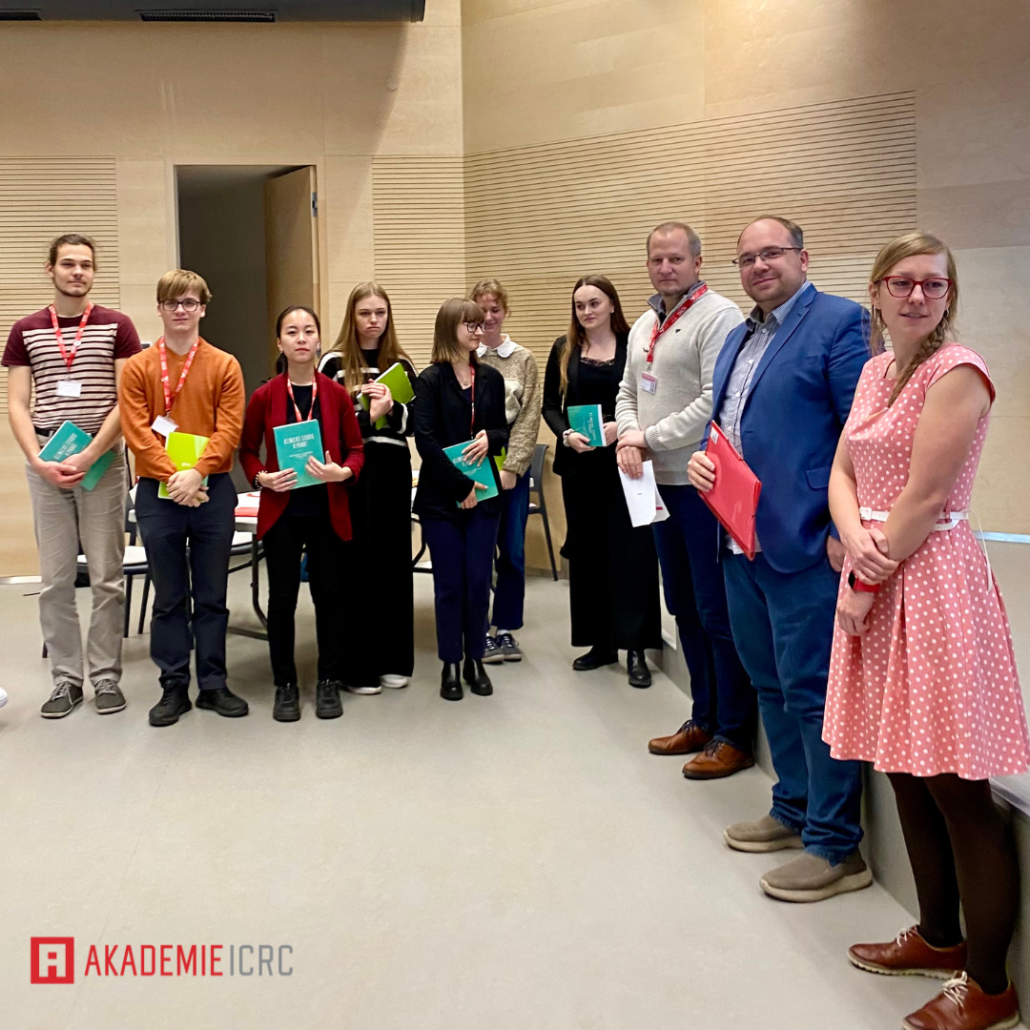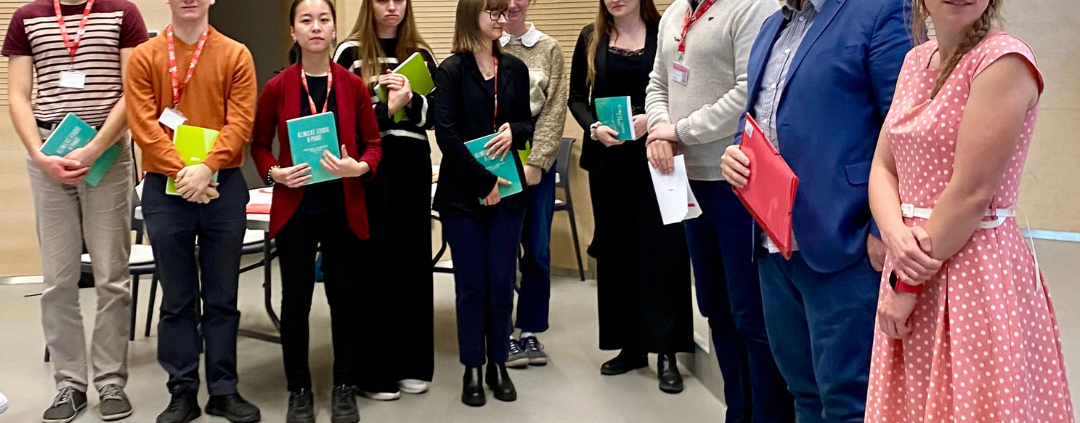Academy ICRC Supports Talents: Interviews with Winning Students
For more than a decade, the ICRC Academy has been opening doors to the world of science and research for high school and university students. This exceptional educational platform connects curious young people with experts, offering insights into the backstage of clinical and preclinical research. Through the Academy, students find inspiration, deepen their knowledge, expand their horizons regarding career opportunities, and network with other motivated students. To date, over 3,000 students have participated in the Academy, with more than 100 having completed internships with ICRC research teams. Some of these students continue to work in these teams or have found opportunities in partner institutions or abroad. Many of them later return to the Academy as lecturers or mentors, sharing their experiences with new participants.

The ICRC Academy is especially known for its events – from engaging online Science Talks with experts on various topics, to LabTours at different workplaces, and weekend seminars packed with intensive education in science and research.
This year’s seminar took place in early November and welcomed 52 students from various schools and fields, who experienced a weekend full of lectures, interactive small group sessions, and fascinating discussions.
The biggest challenge for the participants of the November seminar was a team competition. This year, the teams were tasked with processing a scientific article into a presentation, which they had to defend before an expert jury composed of Head of ICRC professor Michal Masařík, scientist and coordinator of BEATsep project Marcela Hortová Kohoutková and scientist and cardiologist Martin Pešl.
The seminar not only supports the development of knowledge and skills, but also brings participants closer to the real dynamics of scientific work. For many, it was their first experience in presenting research results, and it must be said that all the teams did an absolutely excellent job of processing the assigned project. However, only one team could win. It was the team consisting of:
- Tereza Bílková – Masaryk University, Faculty of Science
Molecular Biology and Genetics - Martin Dominik – Masaryk University, Faculty of Medicine
General Medicine - Viktorie Duong – Masaryk University, Faculty of Medicine
General Medicine - Jan Kozma – Christiana Doppler´s Grammar School
- Lucie Šípková – Masaryk University, Faculty of Science
Bioanalytical Laboratory Diagnostics in Healthcare - Aneta Venhudová – Brno University of Technology, Faculty of Electrical Engineering and Communication
Bioengineering - Veronika Zpěváková – Masaryk University, Faculty of Pharmacy
Pharmacy
How did your team function during the weekend seminar?
Tereza Bílková: Right at the beginning, we created a WhatsApp group, which allowed us to stay in constant contact. I also liked that we clearly divided the tasks, so everyone could fully focus on their role in the team.
Martin Dominik: We mainly used the free time between lectures and other activities to discuss what the most important points were that we wanted to convey in the short 5-minute presentation. That was the most challenging part. During Saturday evening, everyone worked on their assigned section, and then we synchronized everything together via a video call.
Viktorie Duong: In my opinion, a crucial factor was that most of us were studying different fields, which allowed us to see things from a different perspective.
Veronika Zpěváková: Additionally, everyone in our team had the same opportunity to get involved and contribute throughout the process. There was a friendly and safe atmosphere among us, where no one had to fear expressing their opinion.
What do you think contributed to your team’s success as the winners of the competition?
Jan Kozma: It’s hard to say. Until the announcement of the winners, none of us believed we would win the competition. However, looking back, I would say it was because we selected only the most essential points from our article. Which, when presenting a scientific study in just five minutes, is not the easiest task.
Aneta Venhudová: I would say that we divided the topics correctly, deciding who would work on which part. But from what I observed while other teams were presenting, it seemed like they did something similar. So it’s hard to say what the judges liked the most.
Lucie Šípková: Our success is probably due to mutual support, communication, and excellent teamwork throughout the entire weekend.
What did you like most about the seminar?
Aneta Venhudová: The variety of topics that were discussed and the concept of the competition as a presentation of a scientific article. Especially for participants who are still in high school or have never presented, for example, a bachelor’s thesis, I think it’s a very valuable experience.
Viktorie Duong: What I liked most was the dedication and passion for the subject that almost all the speakers showed, both during the official program and at the informal evening meeting. I also appreciate the entertaining lectures and workshops, from which I took away countless useful tips and advice.
Veronika Zpěváková: I truly appreciate the entire organization and creativity of the seminar. Every lecture and every speaker brought an interesting topic, and the group project brought us closer together. The cherry on top was the great atmosphere that surrounded us throughout the entire weekend.
What is the main thing the seminar brought you, and how will it influence your future plans?
Tereza Bílková: What I am taking away is mainly the motivation to continue studying my field and improving in it. I also learned that there’s no point in being afraid to contact research team leaders with an interest in completing an internship. Sometimes, even just one email can open up a whole new world full of great opportunities.
Martin Dominik: Mainly, I am happy to have met people again who don’t view education and work as just a necessary evil. I’m also grateful for all the lectures from which I took several pages of interesting notes. The seminar reinforced my desire to pursue both clinical practice and research in the future. I was unsure about which direction to take, but now I feel that doing clinical research without clinical experience might fall short. There could be a lack of connection to reality, and the results might be harder to apply.
Lucie Šípková: In particular, valuable information about clinical research and practical skills, such as interview preparation and project presentations. I will use these experiences both in my studies and in my future career.
Jan Kozma: The seminar primarily provided me with a wide range of new knowledge. Not only in the current areas of clinical research but also many tips for students on how to succeed if they pursue a scientific career. Personally, I was able to apply the information from the seminar immediately after it ended.




